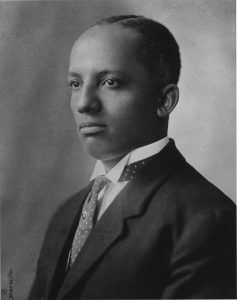By Robyn Wheeler Grange for the Argonne African American
Employee Resource Group
University of Chicago graduate Carter G. Woodson introduced the first celebration of Negro History Week in Chicago in February 1926. As a historian, he believed that American history could not be fully understood without studying the contributions of African Americans. Negro History Week would provide the context in which to highlight their accomplishments and their central role in history.

He chose February for the commemoration to build on the pre-existing birthday celebrations of Abraham Lincoln (February 12th) and Frederick Douglass (February 14th). By doing so, he encouraged the extension of Black history beyond these two men to include the countless Black men and women who contributed to advance the nation specifically, and human civilization in general. Woodson’s idea was embraced across the country in schools and with the public. Teachers demanded materials to instruct their pupils, Black history clubs sprang up, and as Black populations grew in cities, mayors issued Negro History Week proclamations.
As Black pride and identity increased in the late 1960s and early 1970s, President Gerald Ford responded by officially recognizing Black History Month. He called upon the public to “seize the opportunity to honor the too-often neglected accomplishments of Black Americans in every area of endeavor throughout our history.” Today, this month-long celebration is embraced by other countries such as the Netherlands, Ireland, Canada, and the United Kingdom. Each nation joins America by recognizing and honoring African people’s contributions to their history.
Woodson’s effort provides a powerful example of two of the core values we embrace at Argonne, Impact and Respect. His work has significantly transformed the way people think about African American history and fostered appreciation and respect for the contributions of African Americans to our nation.
The original intent of this month-long commemoration has not been fully realized. That is because Woodson never viewed Black history as a one-week or one-month matter. Woodson believed that African American history was too important to America and the world to be crammed into a limited time frame. So, he pressed for schools to use Negro History Week to demonstrate what students learned all year and established African American studies programs to reach adults throughout the year. Ultimately, his real intention was for there to be a time when an annual acknowledgment would no longer be necessary but rather, the study and celebration of African American history would be integrated into the fabric of our nation.
In recognition of Woodson’s real intent, the Argonne African American Employee Resource Group encourages everyone to regularly explore the contributions of all Americans to our national success story.
Please feel free to visit these resources to learn more:
Carter G. Woodson – https://www.history.com/news/the-man-behind-black-history-month
Association for the Study of African American Life and History (established by Woodson in 1915) – https://asalh.org/about-us/
History behind Black History Month – https://www.npr.org/2022/02/01/1075623826/why-is-february-black-history-month
Black History Month Events – https://www.chicagoparent.com/things-to-do/guides/black-history-month-events/


